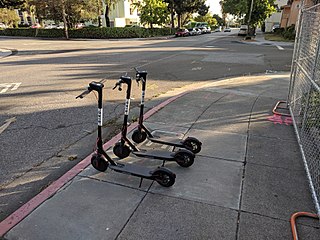New ways of getting around our communities keep popping up: Lyft now claims to be available for ridehailing statewide, bikeshare systems are active in half a dozen cities (and under consideration in others), and now:
Electric scooter sharing has arrived in Michigan.

You heard me right: scooters.
Last week, Bird Rides Inc. deployed e-scooters in parts of downtown Detroit. Anyone (with a smartphone and credit card) can take a ride by using Bird’s app to find and unlock an available scooter, zooming to their destination at up to 15mph, and then leaving the scooter anywhere it won’t be a nuisance for the next rider to find and use.
Like some bike-share systems, these scooters are “dockless,” which means they can be picked up and dropped off anywhere, rather than only at defined (and costly) stations. Not only does this mean scooters could end up in odd or problematic places, it means the companies deploying them don’t need to do any construction or make significant capital investment, so may skip even a conversation with municipal staff-just, poof, one day the vehicles suddenly appear around town.
It’s too soon to have a good understanding of what impacts these vehicles will have, but it’s exactly the right time to think about nudging those impacts in the right direction. Before e-scooters (or e-bikes) hit your downtown is the best time to think about managing any downsides if (when?) they arrive locally, and to push them to improve mobility broadly within your community.
Fortunately, resources are emerging that can help communities navigate these issues:
- Alex Baca recently wrote a primer on dockless bikeshare for CityLab and a followup Q & A with BetterBikeShare.org—both aimed at city officials trying to wrap their heads around these systems, and most of which is immediately applicable to e-scooters deployments as well. Baca formerly ran a bikeshare system in Cleveland, so has hands-on operational experience with some versions of these modes.
- NACTO just released version 1 of their Guidelines for the Regulation and Management of Shared Active Transportation, which outlines recommended standards for issues like operation of vehicles in the public right-of-way, vehicle maintenance, provision of usage data, parking expectations, and programs to provide equitable access to low-income residents.
- Detroit’s DPW has issued initial guidance on how the city’s existing nuisance and right-of-way codes are likely to apply to e-scooters, including expectations around their maintenance, placement, and use, with the caveat that this first interpretation is likely to change as the city gains direct experience with the vehicles.
That caveat, “subject to change at any time and without notice as understanding and experience continues to develop,” is a good summary of the overall approach communities will need to take towards these new transportation devices. Let us know what challenges your community encounters!